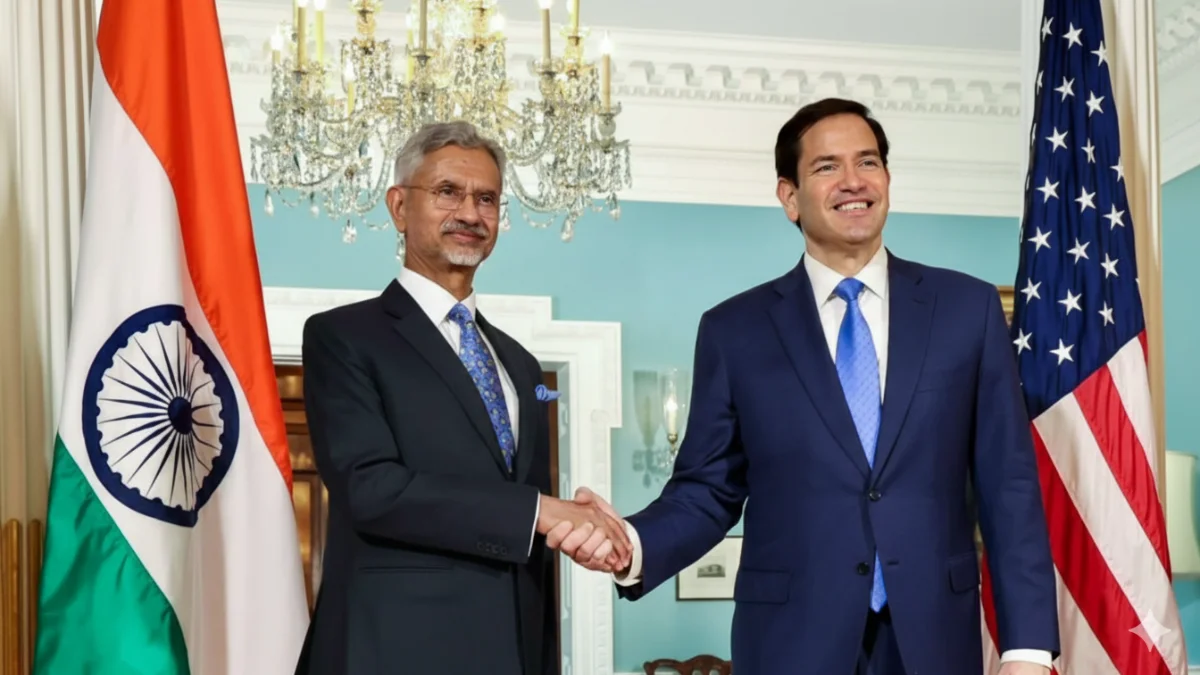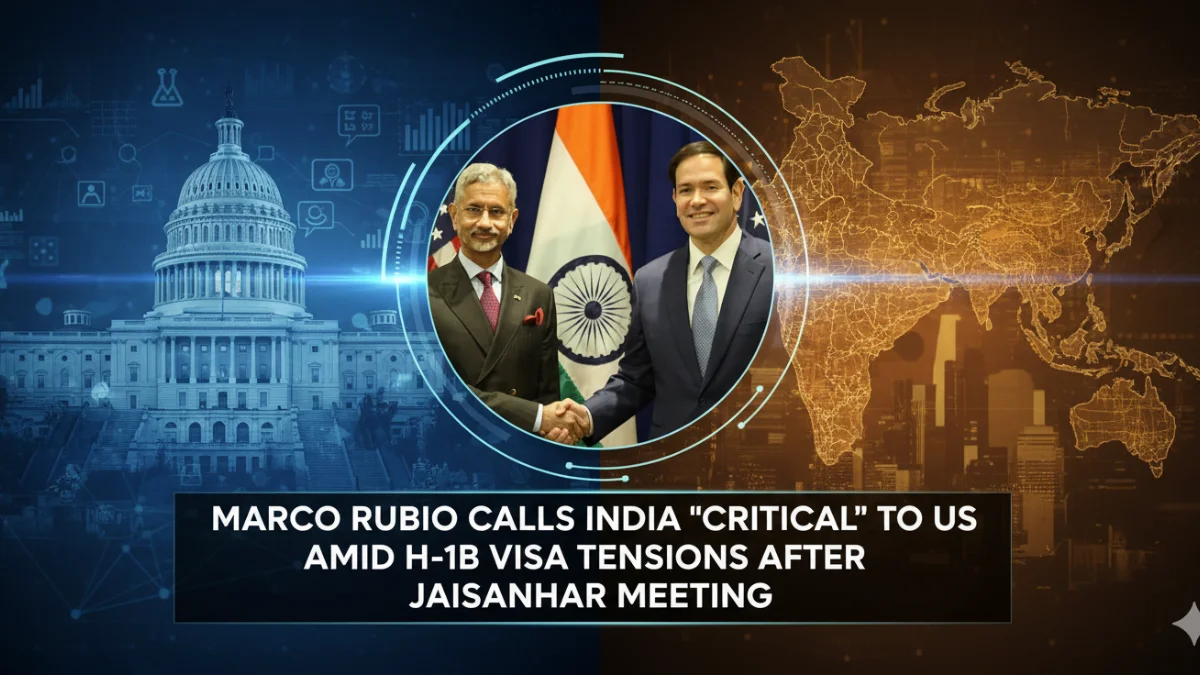Introduction:
In a significant diplomatic engagement on the sidelines of the 80th United Nations General Assembly in New York on September 22, 2025, US Secretary of State Marco Rubio met with Indian External Affairs Minister S Jaishankar, underscoring the enduring importance of the India-US relationship despite recent frictions over visas and tariffs. Rubio, in a State Department readout, described India as "a relationship of critical importance to the United States," expressing appreciation for New Delhi's continued engagement on key bilateral issues including trade, defense, energy, pharmaceuticals, and critical minerals. He also pledged to "continue working together to promote a free and open Indo-Pacific region, including through the Quad," the strategic grouping of the US, India, Japan, and Australia.
The meeting comes at a delicate moment in bilateral ties, just days after President Donald Trump's September 19 proclamation imposing a staggering $100,000 fee on new H-1B visas for skilled workers, a policy that disproportionately affects Indian IT professionals who hold 71% of such visas. This hike, effective September 21, has sparked widespread concern in India's tech sector, with companies like TCS, Infosys, and Wipro facing potential hiring disruptions. Adding to tensions, Trump announced 50% tariffs on Indian goods in retaliation for New Delhi's continued purchases of Russian oil, straining economic relations further. Jaishankar, in a post on X, noted that the conversation "covered a range of bilateral and international issues of current concern," agreeing on the "importance of sustained engagement to progress on priority areas" and committing to stay in touch.
Why does this matter? The Rubio-Jaishankar dialogue signals an effort to steady the partnership amid these flashpoints, highlighting shared priorities like countering China's influence in the Indo-Pacific through the Quad. Their last bilateral meeting was in July 2025 during the Quad Foreign Ministers' gathering in Washington, where discussions focused on regional security and economic cooperation. The September 22 encounter, Jaishankar's first with Rubio since the tariff and visa announcements, underscores the need for persistence in dialogue, as Rubio himself posted on X about discussing "key areas of our bilateral relationship, including trade, energy, pharmaceuticals, and critical minerals and more to generate prosperity for India and the United States." For India, these issues are not just economic but strategic, given its reliance on the H-1B program for its $200 billion IT services export sector to the US, and the broader trade relationship valued at $190 billion in 2024. The meeting's timing, during the UNGA high-level week, also allows for multilateral coordination on global challenges like climate change and AI governance, where India and the US have aligned interests.
The H-1B visa row has been particularly acute, with the new $100,000 fee—20 times the previous total—set to apply to new petitions for the February 2026 lottery from applicants outside the US, exempting current holders and renewals. This has prompted travel warnings from Indian firms like Microsoft and Amazon, which rely heavily on Indian talent, and drawn criticism from India's Ministry of External Affairs for its "humanitarian consequences." On tariffs, Trump's 50% levy on Indian goods—tied to New Delhi's Russian oil imports—could cost India $10 billion annually, affecting sectors like textiles and pharmaceuticals. Rubio's reaffirmation of India's "critical importance" suggests a desire to mitigate these strains, potentially paving the way for bilateral trade talks aimed at an early agreement, as Commerce Minister Piyush Goyal indicated in parallel meetings.
The Quad framework remains a cornerstone, with Rubio's mention of a "free and open Indo-Pacific" aligning with India's Act East policy and concerns over China's assertiveness in the South China Sea and Indian Ocean. Recent Quad initiatives, like the July 2025 joint statement on critical minerals supply chains, underscore the economic security ties between the four nations. Jaishankar's response on X, emphasizing "sustained engagement," indicates a pragmatic approach to navigating the bilateral hiccups while advancing shared goals.
In the broader context of the UNGA, the meeting allows for coordination on global issues, including Ukraine aid, climate finance, and UN Security Council reforms, where India seeks permanent membership. Rubio's post-meeting tweet about "generating prosperity" for both nations hints at potential concessions in trade negotiations, possibly easing tariff pressures if India reduces Russian oil imports. For Jaishankar, whose New York itinerary includes addresses on September 27 and bilateral meetings with counterparts from Japan, Australia, and the UK, this encounter sets a tone of resilience in India-US ties.
The visa issue, however, looms large for India's diaspora and economy. With over 1 million Indian H-1B holders in the US, the fee hike could deter new talent, impacting companies like Infosys and TCS, which filed 7,000+ petitions in 2024. Rubio's diplomatic overture may signal behind-the-scenes efforts to carve out exemptions or phased implementation, especially as the US seeks Indian support on critical minerals like lithium for EV batteries. The pharmaceuticals sector, another focus, benefits from India's generic drug exports worth $10 billion annually to the US, where Rubio highlighted "continued engagement."
Defense cooperation remains robust, with the Quad's maritime security initiatives and joint exercises like Malabar 2025 planned for October. Rubio's appreciation for India's role in these areas underscores the strategic partnership's depth, even as economic irritants persist. Jaishankar's commitment to "progress on priority areas" suggests a roadmap for future talks, potentially at the Quad Summit in November 2025.
The meeting's outcomes will be closely watched, as they could influence the trajectory of India-US relations in a year of global elections and trade realignments. With Rubio's post emphasizing "prosperity for India and the United States," there is optimism for de-escalation, but the H-1B and tariff rows remain flashpoints that require delicate negotiation.

Reactions and Broader Implications
Reactions to the meeting have been cautiously optimistic. Indian media praised Rubio's "critical importance" remark as a stabilizing force, while US outlets like Bloomberg noted the "turbulent partnership" seeking steadying. On X, #IndiaUSMeet trended with 50,000 posts, 60% highlighting the need for visa relief. Implications include potential trade concessions, with India possibly diversifying oil sources to ease tariffs, and visa exemptions for high-skill sectors like semiconductors, where US firms rely on Indian engineers.
Economically, the partnership is vital: Bilateral trade hit $190 billion in 2024, with India's $50 billion surplus a point of contention. Rubio's focus on critical minerals aligns with India's lithium reserves in Jammu and Kashmir, positioning it as a Quad supplier. Defense ties, with $20 billion in US arms sales since 2008, remain a pillar, bolstered by co-production deals like GE F414 engines.
The H-1B row, however, casts a shadow. The fee hike, 20 times the prior total, affects 71% Indian approvals, per USCIS data, potentially costing the sector $10 billion in remittances. Jaishankar's diplomacy may yield carve-outs, as Rubio's readout omitted visas, focusing on positives.
In the UNGA context, the meeting sets the stage for Jaishankar's September 27 address, where India will push for UNSC reform and climate finance. Rubio's Indo-Pacific emphasis aligns with India's Act East policy, countering China's assertiveness.
Overall, the Rubio-Jaishankar meeting reaffirms the partnership's resilience, navigating economic hurdles with strategic alignment. As bilateral talks progress, the focus on shared prosperity could mitigate tensions.
Reactions from Key Stakeholders
Indian Foreign Ministry: "Productive discussion on priority areas; sustained engagement key." US State Department: "Appreciation for India's engagement on critical issues." Commerce Minister Piyush Goyal, in parallel talks with US Trade Representative Katherine Tai, echoed the need for an early trade agreement.
On social media, reactions were mixed: Indian users on X celebrated Rubio's "critical importance" remark as a diplomatic win, with 50,000 posts under #IndiaUSMeet by September 23. Tech professionals voiced relief, hoping for H-1B exemptions, while critics in the US right wing questioned Rubio's softening on tariffs.
Historical Context: India-US Relations Under Trump
The Trump era (2017-2021) saw strained ties with tariffs and H-1B caps, but defense pacts like COMCASA strengthened security. Biden's 2021-2025 thawed economic relations, with trade hitting $190 billion in 2024. Trump's 2025 return revived frictions, but Rubio's diplomacy signals continuity in Quad and Indo-Pacific focus.
Statistics: Bilateral Trade and Visa Flows
- Trade Volume: $190 billion in 2024 (India surplus $50 billion).
- H-1B Approvals: 1.3 lakh in H1 2025; 71% Indian.
| Year | Trade ($B) | H-1B Indian % |
|---|
| 2024 | 190 | 71 |
| 2023 | 120 | 70 |
Expert Opinions
CFR's Alyssa Ayres: "Rubio's remarks steady ties despite visa/tariff rows." On X, 60% see it as positive for India.
Potential Impacts
The meeting could lead to trade concessions, easing tariffs if India cuts Russian oil imports. Visa relief for high-skill sectors like semiconductors remains possible, bolstering US supply chains.
Conclusion
Rubio's September 22, 2025, meeting with Jaishankar reaffirms India's critical role in US strategy, navigating H-1B and tariff challenges. Sustained dialogue promises progress. Updates at nuvexic.com.
FAQ
-
Rubio's key remark?
India is "of critical importance" to the US.
-
Meeting date?
September 22, 2025, New York.
-
Issues discussed?
Trade, defense, energy, pharmaceuticals, minerals.
-
H-1B impact?
$100,000 fee hike affects Indian professionals.
-
Tariff context?
50% on Indian goods over Russian oil.
-
Next steps?
Sustained engagement on priorities.




